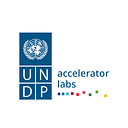Tackling digital misinformation with the Healthy Internet Project
By Anand Upender, Design Lead, and Renae Reints, Researcher, Healthy Internet Project
The UNDP Accelerator Labs is excited to announce its collaboration with the Healthy Internet Project, incubated at TED. This partnership is piloting a bold experiment in crowdsourced moderation of the world wide web. UNDP Accelerator Labs in Argentina, Togo, Kenya, Sudan, Iraq, Morocco, Namibia, and Lebanon are leading the effort to further engage their innovation ecosystem and partners to find and address the false, misleading, or personally harmful content in their region.
The UNDP Accelerator Lab in Argentina, for example, will focus their test of the tool on misinformation related to the COVID-19 vaccine. We’ve seen time and time again how information spread online can influence offline issues such as the climate and public health. Whether this comes in the form of COVID-19 conspiracy theories spread on social media or fake job applications to phish private information from a country’s youth, these modern problems are felt in every country in the world. In the coming months, we’ll be working across organizational and national boundaries to understand how a community approach to moderation can solve these issues.
Globally tested, simple tool
The Healthy Internet Project spent the past year building and refining an easy-to-use browser extension with a grand objective: to help make the internet better through crowdsourced moderation. User research and co-creation with people in over ten countries have led to a robust tool, now available in English, Portuguese, Spanish, Arabic, and French. If you have access to a desktop computer, you can add the extension to your browser via either the Chrome or Firefox web stores. A mobile-friendly interface is in the works! On the extension, a quick 5-step onboarding process establishes our shared mission, shares our strict user privacy policy, and demos the tool in context. Then, as you come across sites, articles, or public posts that you find harmful, you can mark, or “flag”, them using the extension. You are able to mark whether the content in question contains lies or manipulation, abuse or harassment, or division or fear. Since good ideas are also out there too, you can flag them to be shared more widely.
Accessibility is inherent to this tool. Anyone with internet access can submit a flag on a URL. To verify these flags and prevent misuse, more experienced users are given “mentorship” responsibilities such as reviewing submitted flags and providing feedback to users. Similar to Wikipedia and other crowd-based systems, users with consistent, quality contributions are given more responsibilities such as moderating content. This additional verification step helps ensure the database of flags is an honest representation of content online.
An experiment to crowdsource harmful content
How might this curation of the web help such stakeholders better understand and act on the harmful digital content in their communities? All flags are collected into a database accessible to journalists, technology companies, and local thought leaders. We imagine this data can be used in a variety of ways from engaging local communities in discussions on digital misinformation to discovering trends that can be reported on by local news outlets. With the involvement of eight UNDP Accelerator Labs and their local partners, we are thrilled to announce that we will bring a larger and more diverse ecosystem of flaggers, mentors, and database partners to the Healthy Internet Project — communities who can collectively spot, evaluate, and act upon the best and worst of the web. We’re excited to see what we learn together!
— — —
- Get in touch and join our conversations online via @UNDPAcclabs
- If you would like to collaborate with us, please email us at accelerator.labs@undp.org.
- Find out more about other UNDP Accelerator Lab initiatives that tackle digital misinformation: http://bit.ly/NETWORKEFFECTcoronachampion
